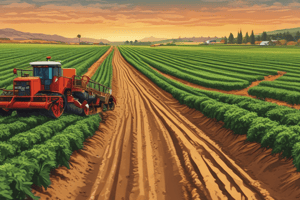Podcast
Questions and Answers
What role do agricultural markets play in global food security?
What role do agricultural markets play in global food security?
- Ensuring climate resilience for crops worldwide
- Reducing volatility in individual countries' food production (correct)
- Increasing labor force participation in developing countries
- Minimizing government intervention in food safety policies
How does climate change impact agricultural markets?
How does climate change impact agricultural markets?
- It causes disruptions in transportation networks
- It enhances crop yields and productivity
- It leads to decreasing labor opportunities in the sector
- It significantly affects crop yields and productivity (correct)
What economic impact does the COVID-19 pandemic have on agricultural markets?
What economic impact does the COVID-19 pandemic have on agricultural markets?
- Creating labor surplus in the agricultural sector
- Emphasizing the need for adaptive approaches in managing challenges (correct)
- Reducing the need for flexible strategies in agriculture
- Increasing consumer preferences for agricultural products
How do agricultural markets contribute to income generation?
How do agricultural markets contribute to income generation?
What is the impact of government policies on agricultural markets?
What is the impact of government policies on agricultural markets?
How can developing resilient farming practices help mitigate challenges in agricultural markets?
How can developing resilient farming practices help mitigate challenges in agricultural markets?
What role do farmers play in agricultural markets?
What role do farmers play in agricultural markets?
Who are the middlemen between farmers and consumers in agricultural markets?
Who are the middlemen between farmers and consumers in agricultural markets?
What factors can impact the success of farmers in agricultural markets?
What factors can impact the success of farmers in agricultural markets?
How do consumers influence demand levels in agricultural markets?
How do consumers influence demand levels in agricultural markets?
Which platforms are examples of agricultural markets?
Which platforms are examples of agricultural markets?
What is the main function of traders and intermediaries in agricultural markets?
What is the main function of traders and intermediaries in agricultural markets?
Flashcards are hidden until you start studying
Study Notes
Agricultural Markets
Understanding Agricultural Markets
Agricultural markets refer to the platforms where farmers buy and sell their goods. These markets can be physical locations like farmers' markets or online platforms where buyers and sellers connect to exchange agricultural products. The agriculture sector encompasses a wide range of commodities, including crops, livestock, and other farm produce. Understanding how these markets operate and their impact on global food security is crucial.
Components of Agricultural Markets
Farmers
Farmers play a critical role in agricultural markets. They produce the raw materials that fuel our economy, providing essential goods such as grains, fruits, vegetables, and dairy products. Their success depends on factors like weather conditions, market price fluctuations, and government policies.
Consumers
Consumers are another important component of agricultural markets. They purchase the agricultural products from farmers and other suppliers, either directly through local markets or indirectly via grocery stores. Consumer preferences and purchasing power influence demand levels for various agricultural products.
Traders and Intermediaries
Traders and intermediaries act as middlemen between farmers and consumers. They buy produce from farmers and sell it to retailers or other buyers. Their role helps ensure the smooth flow of goods through the supply chain, but they can also influence market prices and profitability for both farmers and themselves.
Economic Impact of Agricultural Markets
Global Food Security
Agricultural markets play a significant role in global food security. They enable farmers around the world to access diverse markets, allowing them to sell their produce across borders. This trade reduces volatility in individual countries' food production by providing access to a wider range of products, mitigating risks associated with localized crop failures and climate events.
Income Generation
Farming can be an essential source of income for many people worldwide. Agriculture provides employment opportunities, particularly in developing countries where the sector often employs more than half of the labor force.
Trade Policy
Governments intervene in agricultural markets through various policies aimed at protecting domestic producers, ensuring food safety, and managing price fluctuations. These policies can have significant economic implications, influencing international trade flows and potentially impacting global food availability and affordability.
Challenges Facing Agricultural Markets
Climate Change
Climate change poses a major threat to agricultural markets. Changes in temperature, precipitation patterns, and extreme weather events can significantly affect crop yields and productivity. Developing resilient farming practices and adapting to these changes will be crucial for maintaining stable agricultural markets in the future.
COVID-19
The COVID-19 pandemic has highlighted vulnerabilities within agricultural systems. Disruptions to transportation networks, labor shortages, and changing consumer preferences have all had an impact on agricultural markets, emphasizing the need for flexible and adaptive approaches to manage these challenges.
In conclusion, understanding agricultural markets is vital for ensuring global food security, supporting rural communities, and navigating the complexities faced by farmers due to factors like climate change and pandemics. By studying these markets and implementing appropriate strategies, we can help promote sustainable agriculture and foster economically vibrant rural areas around the world.
Studying That Suits You
Use AI to generate personalized quizzes and flashcards to suit your learning preferences.




